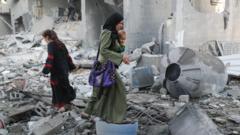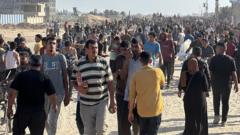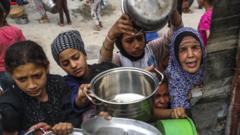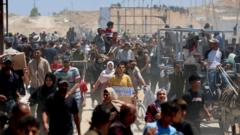**The al-Awda hospital, the final facility providing medical services in Northern Gaza, has ceased operations following an evacuation order from the Israeli military, exacerbating the humanitarian crisis in the region.**
**Last Hospital in Northern Gaza Shuttered Amid Israeli Military Order**
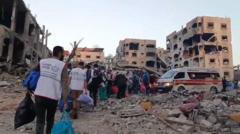
**Last Hospital in Northern Gaza Shuttered Amid Israeli Military Order**
**Health Services Cut Off as Evacuation Leaves Region Without Medical Care**
In a significant escalation of the ongoing conflict, the last hospital in Northern Gaza, the al-Awda, has been rendered non-operational after the Israeli military mandated its evacuation. The hospital's director, Dr. Mohammed Salha, reported that patients were moved from the facility located in Jabalia late Thursday, following what he described as "two weeks of siege." Due to the Israeli Defense Forces (IDF) orders, there are now no medical services functioning in the northern region, a devastating blow to the local population.
Dr. Salha, in an interview, expressed deep sadness regarding the evacuation, revealing that the decision was made under the threat of bombings and injuries posed to patients and medical staff. Initial resistance to the evacuation request gave way after prolonged negotiations with military officials, leading to a forced relocation process that took seven hours to complete.
The evacuation involved carrying patients over 300 meters across treacherous, destroyed terrain to reach ambulances. Those evacuated were transported to the al-Shifa hospital in Gaza City, with the operational capacity of local healthcare severely compromised. The WHO's Director-General, Tedros Adhanom Ghebreyesus, emphasized that closing al-Awda has critically severed medical access for the region, urging global awareness and aid to protect healthcare facilities.
This incident unfolds against the backdrop of ongoing negotiations for a ceasefire between Hamas and Israel, with the U.S. indicating a potential framework for a truce, which includes a 60-day pause in hostilities and the release of hostages. However, Hamas has contested the proposed terms, calling them insufficient in meeting fundamental demands.
In the meantime, humanitarian conditions in Gaza have drastically deteriorated as the region faces severe food shortages. A troubling report from a UN humanitarian agency classified Gaza’s population at a critical risk of famine, prompting international pressure on Israel to allow more aid into the area. Recent military operations by Israel following the attacks from Hamas on October 7 have seen high casualty numbers, escalating the urgency for humanitarian intervention.
As responses from international leaders advocate for increased aid and protection for civilians in conflict zones, the reality on the ground continues to reflect a desperate need for comprehensive strategies to address both immediate medical needs and the long-term humanitarian crisis facing the area.
Dr. Salha, in an interview, expressed deep sadness regarding the evacuation, revealing that the decision was made under the threat of bombings and injuries posed to patients and medical staff. Initial resistance to the evacuation request gave way after prolonged negotiations with military officials, leading to a forced relocation process that took seven hours to complete.
The evacuation involved carrying patients over 300 meters across treacherous, destroyed terrain to reach ambulances. Those evacuated were transported to the al-Shifa hospital in Gaza City, with the operational capacity of local healthcare severely compromised. The WHO's Director-General, Tedros Adhanom Ghebreyesus, emphasized that closing al-Awda has critically severed medical access for the region, urging global awareness and aid to protect healthcare facilities.
This incident unfolds against the backdrop of ongoing negotiations for a ceasefire between Hamas and Israel, with the U.S. indicating a potential framework for a truce, which includes a 60-day pause in hostilities and the release of hostages. However, Hamas has contested the proposed terms, calling them insufficient in meeting fundamental demands.
In the meantime, humanitarian conditions in Gaza have drastically deteriorated as the region faces severe food shortages. A troubling report from a UN humanitarian agency classified Gaza’s population at a critical risk of famine, prompting international pressure on Israel to allow more aid into the area. Recent military operations by Israel following the attacks from Hamas on October 7 have seen high casualty numbers, escalating the urgency for humanitarian intervention.
As responses from international leaders advocate for increased aid and protection for civilians in conflict zones, the reality on the ground continues to reflect a desperate need for comprehensive strategies to address both immediate medical needs and the long-term humanitarian crisis facing the area.


